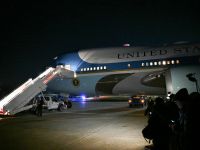U.S. Assistant Secretary of State for Near East Affairs Edward Walker on March 1st met with Turkish Foreign Minister Ismail Cem during a tour of Middle East capitals to drum up support for the Bush administration’s new policies on Iraq and sanctions.
Turkey, along with other U.S. allies in the Middle East and Europe, has said that sanctions have only hurt ordinary Iraqi citizens.
U.S. Secretary of State Colin Powell has proposed implementing “smart sanctions” against Iraq that would lift restrictions on the import of civilian and humanitarian goods, while tightening controls on military equipment and supplies.
Walker said that: “We’re trying to do everything we can for this change in approach to ensure that we’re not responsible for the impoverishment or death or lack of medical attention that we’ve been accused of.
We are looking for a way that has less impact on the people of Iraq, but still maintains the controls on weapons development that we believe are necessary.”
He indicated that the new U.S. policies would strive to reduce the economic burden of sanctions on Iraq’s neighbors.
“Our guiding principle is that whatever we do, we do not want the economic impact to be born by [Iraq’s] neighboring states,” the assistant secretary of state said.
Cem had told Walker that Ankara would like to see a reexamination of U.S. policies on Iraq. “We have said that we have lost a lot since the sanctions took effect.
We’ve met U.N. resolutions, but our desires have not been met,” he said. Trade between Turkey and Iraq has fallen sharply from $2.5 billion a year in the early 1990s, and Ankara has claimed that sanctions have cost it nearly $40 billion.
U.S. Secretary of State Colin Powell used his first trip to the Middle East this past week to convince Iraq’s neighbors to crack down on the smuggling of Iraqi crude and products over their borders.
© 2001 Mena Report (www.menareport.com)







